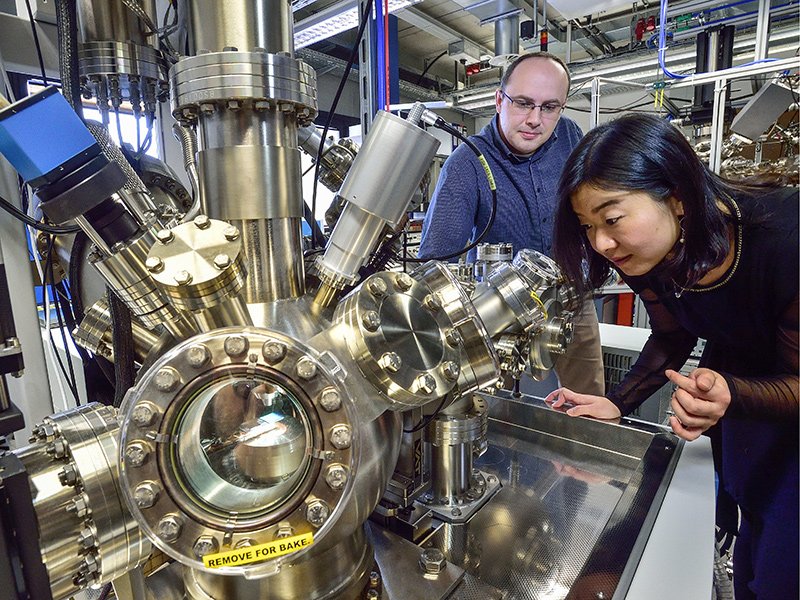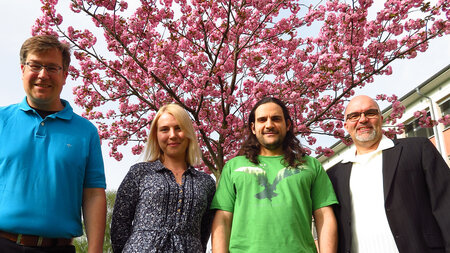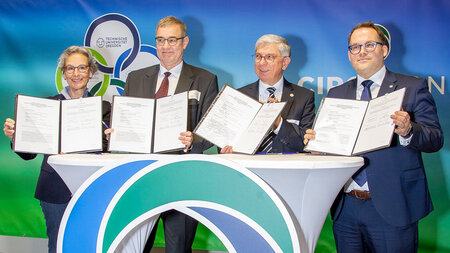Alliance in the Nanouniverse
Scientists from the Russian Federation, Ukraine and Germany are funded to collaborate and explore semiconductor nanocrystals
-

Jing Guo, M.Sc., und Dr. Volodymyr Dzhagan from the Semiconductor Physics group working with a photoelectron spectrometer which allows quantitative analysis of chemical elements with a spatial resolution in the order of micrometers. Dr. Dzhagan from National Academy of Science of Ukraine was strongly involved in the preparation of the project funded by the Volkswagen Foundation. Photo: Pressefoto Schmidt
Semiconductors are of a great significance as switches, amplifiers, and rectifiers of electric current. Therefore, they are widely used in sensorics and energy transformation, photovoltaics, light emitting diodes, and catalysis. A new special class of semiconductors, semiconductor nanocrystals, still provides a challenge for scientific research for years. One reason for this lies in the discrepancy between theoretical and experimental approaches: in contrast to the ideal theoretical models, which treat the nanocrystals as isolated objects, the real nanocrystal objects are typically surrounded by organic molecules which heavily influence their properties. The understanding of their interaction is an important prerequisite for further progress in the development of environmentally friendly and cheap nanomaterials. The new project at TU Chemnitz together with the National Academy of Science of Ukraine in Kyiv and the Russian Academy of Science in Novosibirsk start at this point. Its goal is the development of various ‘green’ and versatile methods of nanocrystal fabrication. For characterisation purposes scientists will apply a variety of optical and electron spectroscopy as well as microscopy techniques.
This project is funded with 249.600 Euros in the framework of the “Trilateral Partnership – Cooperative Project between scientists from Ukraine, the Russian Federation, and Germany” program of the Volkswagen Foundation. Prof. Dr. Dietrich R.T. Zahn, the head of Semiconductor Physics group at TU Chemnitz, will coordinate the three-year fixed-term projects from the German side. Altogether, the Volkswagen Foundation has approved and funded 39 ‘Trilateral Partnerships’ with ca. 8.9 million Euros. German project partners are spread over entire country. These projects come from different scientific fields such as bioscience, psychology, and sociologic sciences as well as MINT (Math, Computer science, Natural science, and Technology) subjects. The grant amount of the 36 research projects are between 200,000 and 250,000 Euros, while 3 event series are funded with an amount between 55,000 and 130,000 Euros. Altogether over 200 applications for cooperative research projects were received by the foundation.
Background of the “Trilateral Partnership – Cooperative Project between scientists from Ukraine, the Russian Federation, and Germany” program: since 2014 the conflict between the Russian Federation and Ukraine has incrementally hindered the fruitful cooperation between excellent scientists from both countries. The Volkswagen Foundation as a non-government organization is considered as a mediator wanting to motivate the dialog and collaboration despite geographic borders or political-diplomatic conflicts. As a result the organization contributes to the establishment of trust and communication, as well as closer relations, helping joint research to set up reliable and innovative foundation.
Mario Steinebach
22.03.2016





